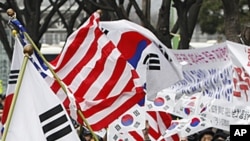A controversial trade pact between South Korea and the United States that becomes a reality Thursday has drawn skepticism from opposition politicians in South Korea who are not accepting it as a fait accompli.
The deal, known as the Korea-U.S. Free Trade Agreement, at one stroke, eliminates tariffs on more than 7,000 South Korean products and nearly 62,000 American goods and services.
Advocates here predict it will help expand South Korea's GDP by nearly six percent, in the next ten years.
But the main opposition party is having none of it. It foresees the trade pact benefiting big corporations at the expense of smaller companies, workers and farmers.
There is also widespread skepticism whether South Korean consumers will see prices decrease commensurate with the tariff cuts or whether those in the supply chain will just pocket extra profits.
Former prime minister Han Myung-sook, who is the chairwoman of the Democratic United Party, insists the deal must be re-negotiated.
Han says her party will push for fresh trade talks with Washington if it retakes power following this year's national assembly and presidential elections.
But Han doesn't go as far as some members of her party, who say the agreement must be totally scrapped.
Inha University professor of international trade, Hyun Jung-taik, calls the opposition's position unrealistic and illogical.
Hyun notes that, in 2007, when the opposition controlled the government, it believed the deal with the United States was a good one. But two years ago, it changed its stance because of concessions granted to the United States in the automotive sector.
Despite the debate about the agreement's ramifications, what is certain is that, from Thursday, South Korea becomes the only Asian country to have implemented such deals with both the European Union and the United States, the world's two
largest markets.
News
Free Trade Pact with US Draws Opposition in South Korea






